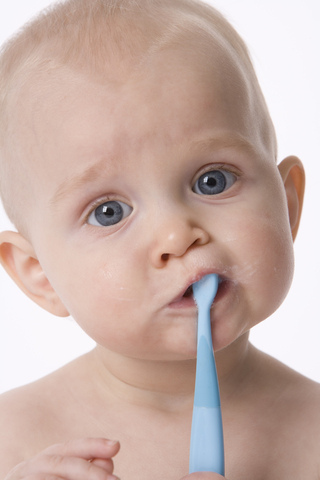
When a child is born, he or she will have 20 primary teeth and 32 permanent teeth. But sometimes kids are born with additional teeth, and our team at Dentistry 4 Kidz calls this oral condition “hyperdontia.” Primary teeth are the first set of teeth that erupt in your child’s mouth, typically by the time they are 36 months old, and are shed by the time your child reaches the age of 12. Permanent teeth then take the place of the primary teeth and are usually fully-erupted by the time your son or daughter reaches 21 years of age. Anyone who develops more than 20 primary teeth or more than 32 permanent teeth has hyperdontia, and the additional teeth are referred to as supernumerary teeth.
While the cause of hyperdontia is not entirely clear, it is believed that there may be a genetic factor. Oral professionals have found that patients with extra teeth often have syndromes like cleidocranial dysplasia, Ehler-Danlos syndrome, Gardner syndrome, or cleft lip and palate. The prevalence of hyperdontia affects between one and four percent of the population in the United States, and the majority of cases are limited to a single tooth.
So, what is the best way to deal with hyperdontia? It really depends on the case. The treatment plan your doctor suggests varies according to the potential problem posed by the supernumerary teeth, as well as their type. Orthodontic treatment may certainly may help, but extraction can also be a good option. We recommend that children receive an oral evaluation or checkup no later than the age of seven. In addition to hygiene evaluation, this helps ensure your child does not experience hyperdontia problems.
If you suspect you or your child may be suffering from hyperdontia, please give us a call to schedule an appointment at our convenient Wichita Falls, TX office to be evaluated.

One question our team at Dentistry 4 Kidz hear all the time is, “When should I start brushing my baby’s teeth?”
You should begin regular cleanings even before your baby has teeth. After each breast feeding (or bottle-feeding) use a clean, damp washcloth to gently rub your baby’s gum tissue. You may wrap the material around one finger to make it easier to remove any food bits from your baby’s mouth.
When your baby’s first tooth comes in, switch to a baby toothbrush. Look for special baby toothbrushes in your drugstore; they have just a few bristles and are very soft. There are even brushes shaped like finger puppets that fit over the tip of your pointer finger! All you need at this point is water (no toothpaste yet).
After a few more teeth appear, you may start using toothpaste, but you only need a tiny bit, and make sure it doesn’t contain fluoride for the first two years. From the beginning, have your little one practice spitting the toothpaste out after brushing. That way, he or she will already have the good habit of spitting when you switch to fluoride toothpaste, which should never be swallowed.
If you have any questions about caring for your baby’s teeth, or to schedule an appointment at our convenient Wichita Falls, TX office, please contact Dentistry 4 Kidz.

Dr. Iyer and our team at Dentistry 4 Kidz know that periodontal disease isn’t something exclusive to adults. It can affect adolescents as well. Gingivitis, which is a milder form of periodontitis, is a form of periodontal disease, and a warning that more serious problems may arise. Untreated gingivitis can develop into full-blown periodontitis.
The American Academy of Periodontology (AAP) explains that research proves that younger people may develop more severe forms of gingivitis. Gingivitis is linked to periodontal disease. Children and adolescents who have type 1 diabetes or immune deficiencies are more likely to suffer from periodontal disease.
There are three types of periodontal diseases Dr. Iyer and our team see in children and adolescents.
Chronic gingivitis
Parents may suspect that their adolescent has chronic gingivitis if he or she shows or complains of symptoms such as redness, swelling, or bleeding gums. Early treatment may prevent gingivitis from developing into a more severe form of periodontal disease.
Aggressive and/or chronic periodontitis
Once called adult periodontitis, the term chronic replaces “adult” because periodontitis can occur in people in their early teenage years, and progress throughout their teens. Chronic and aggressive periodontitis primarily affects incisors and first molars. One of its distinguishing characteristics is bone loss. Curiously, patients who suffer from this form of the disease have minimal dental plaque on examination.
Generalized aggressive and chronic periodontal disease
This form of periodontal disease has many of the same characteristics of the chronic and aggressive form, but this more severe type of the disease affects the entire mouth. Symptoms include major plaque and calculus accumulation, and inflamed gums.
In both forms of more severe periodontal disease, the overall gum structure may change. The severity of these changes may alter gum strength enough to loosen teeth, or even worse, cause them to fall out.
The success of any treatment is largely contingent on early diagnosis. Dr. Iyer should conduct a thorough periodontal exam as part of an adolescent’s twice-yearly complete dental examinations.
The mouth is full of bacteria. Some of it is necessary for food digestion. Diseases are more likely to develop if bacteria travel to open places in the mouth, such as exposed gum pockets or cavities. Proper dental hygiene is essential for a healthy mouth, and a healthy mouth offers greater protection against painful dental diseases.
Be sure every member of your family has a complete dental exam and cleaning twice a year, and contact Dr. Iyer when you or your young kids or adolescents complain of pain, sensitivity, or other oral problems. Early detection at our Wichita Falls, TX office leads to treatment of oral problems and prevents them from turning into serious periodontal disease and potentially irreversible problems.

The wisdom teeth are the last of the permanent molars to emerge from the gums. This can occur as early as age 17 or as late as 21. Though some teens and young adults experience a completely normal tooth eruption with ideally aligned molars that pose no health threat, this is not the case for everyone.
According to the American Association of Oral and Maxillofacial Surgeons (AAOMS), wisdom teeth must meet specific criteria to avoid a required extraction. These guidelines include:
If one or more of your child’s wisdom teeth do not meet these conditions, we recommend scheduling an appointment with Dr. Iyer; an extraction may be necessary.
Impacted wisdom teeth
One of the most common reasons for extracting a wisdom tooth is due to impaction. An impacted wisdom tooth is one that has not erupted and will not fully erupt from the gums. Usually this occurs because there is not enough room for the tooth to emerge. Impaction can be painful and can also lead to infection if left untreated. According to the AAOMS, roughly 90 percent of the teen and adult population has at least one impacted tooth. Extracting an impacted wisdom tooth early can help prevent future complications, such as periodontal disease, infections, and damage to neighboring teeth.
Extracting fully erupted wisdom teeth
Even if your child’s wisdom teeth are fully erupted, Dr. Iyer and our team at Dentistry 4 Kidz may recommend removing them as a preventive measure. Fully-erupted third molars often interfere with a healthy bite. This can lead to problems with tooth and jaw alignment and may also contribute to the development of headaches. Your child’s wisdom teeth may also be more prone to tooth decay and gum disease, because their location in the back of the mouth makes them more difficult to reach for brushing and flossing.
To learn more about wisdom teeth, or to schedule an appointment with Dr. Iyer, please give us a call at our convenient Wichita Falls, TX office!